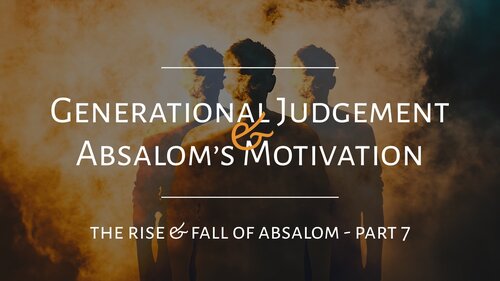Generational Judgement & Absaloms Motivation: The Rise of Absalom: Part 7
Generational Judgement & Absaloms Motivation: The Rise of Absalom: Part 7
Pastor Aaron Rios | Garden City Church | Sept 14th, 2025

A World Crying Out for Justice
In recent weeks, tragedy has shaken our nation:
Different cities, different stories—but the same thread: violence, hatred, injustice, and silence. The silence of leaders. The silence of neighbors. The silence of systems that should protect. And it’s that silence we see in Scripture, too.
Silence in David’s House
2 Samuel 13 paints a painful picture. Tamar is violated by her brother Amnon. King David burns with anger but does nothing. Tamar lives desolate. Absalom simmers in fury, and two years later he murders Amnon.
And silence became the breeding ground for tragedy.
The Spirit of Absalom
This is where the “spirit of Absalom” takes root. It starts with indignation at injustice but refuses to trust God’s justice. It thrives in bitterness, resentment, and a demand for vengeance. It whispers, “God, if You won’t act, I will.”
But here’s the truth: in God’s Kingdom there are no vigilantes. There is law, order, and justice—but no place for revenge.
Why Good Beginnings Go Bad
David started well, but parts of his life were never fully surrendered. He had a passion for God, but the same passion made him reckless with violence. Remember when he almost wiped out Nabal’s household over an insult (1 Samuel 25)?
This is the danger: current sin always erases the memory of God’s past faithfulness. David’s failures muted him. His guilt stole his authority. Instead of confronting sin, he stood paralyzed.
And when leaders go silent, cycles of brokenness are unleashed.
How Silence Feeds Sin
Sin doesn’t just stain—it silences. It robs boldness and convinces us we have no right to speak. But when silence fills the room, sin multiplies:
The Holy Spirit calls us to a different posture: “For the Spirit God gave us does not make us timid, but gives us power, love, and self-discipline” (2 Timothy 1:7).
If We Don’t Speak, Pain Will
David’s silence created space for Absalom’s vengeance. Where the father’s voice was missing, the brother’s sword stepped in. Absalom had the potential to be a prince, but bitterness twisted him into a rebel. This is what silence does: it doesn’t just avoid conflict—it releases cycles of destruction. Unchecked bitterness doesn’t stay personal; it defiles many (Hebrews 12:15). And when the Church avoids truth in the name of love, it leaves a vacuum for anger, resentment, and false voices to rise.
The Danger of Untreated Anger
Paul warns: “In your anger do not sin. Do not let the sun go down while you are still angry, and do not give the devil a foothold” (Ephesians 4:26–27).
Anger left untreated grows roots. Roots give life to trees that will eventually bear fruit. And the fruit of untreated anger is violence, division, betrayal, and rebellion. What could have been healed or at least mediated by David, becomes hostile. and Absalom, who should have became a prince becomes a nemesis.
Breaking the Cycle
Each of us has a choice:
Jesus stepped in where others stayed silent. He healed what others ignored. He broke the cycle and set captives free. That’s the call for us today: don’t let silence raise your Absalom. Let truth and boldness raise your sons and daughters.
Final Charge
This generation isn’t broken because of one offense—it’s bearing the weight of generations of silence, compromise, and untreated sin. But God is raising up men and women who will not bow, will not be silent, and will not let cycles continue.
The Gospel doesn’t silence sin—it confronts it. Not to condemn, but to redeem.
So break your silence. Break the cycle. Let your voice carry the fire of the Holy Spirit. Because if we don’t speak, the enemy surely will.
In recent weeks, tragedy has shaken our nation:
- August 22: Iryna Zarutska, a 23-year-old Ukrainian refugee, was murdered on a Charlotte light rail train.
- August 27: Two children were killed in a mass shooting at Annunciation Catholic Church in Minneapolis.
- September 10: A Colorado student opened fire at Evergreen High School before taking his own life.
- September 10: Conservative activist Charlie Kirk was assassinated at Utah Valley University.
Different cities, different stories—but the same thread: violence, hatred, injustice, and silence. The silence of leaders. The silence of neighbors. The silence of systems that should protect. And it’s that silence we see in Scripture, too.
Silence in David’s House
2 Samuel 13 paints a painful picture. Tamar is violated by her brother Amnon. King David burns with anger but does nothing. Tamar lives desolate. Absalom simmers in fury, and two years later he murders Amnon.
- Tamar wept in silence.
- David raged in silence.
- Absalom plotted in silence.
And silence became the breeding ground for tragedy.
The Spirit of Absalom
This is where the “spirit of Absalom” takes root. It starts with indignation at injustice but refuses to trust God’s justice. It thrives in bitterness, resentment, and a demand for vengeance. It whispers, “God, if You won’t act, I will.”
But here’s the truth: in God’s Kingdom there are no vigilantes. There is law, order, and justice—but no place for revenge.
Why Good Beginnings Go Bad
David started well, but parts of his life were never fully surrendered. He had a passion for God, but the same passion made him reckless with violence. Remember when he almost wiped out Nabal’s household over an insult (1 Samuel 25)?
This is the danger: current sin always erases the memory of God’s past faithfulness. David’s failures muted him. His guilt stole his authority. Instead of confronting sin, he stood paralyzed.
And when leaders go silent, cycles of brokenness are unleashed.
How Silence Feeds Sin
Sin doesn’t just stain—it silences. It robs boldness and convinces us we have no right to speak. But when silence fills the room, sin multiplies:
- Compromise becomes culture.
- Bitterness becomes identity.
- Brokenness passes to the next generation.
The Holy Spirit calls us to a different posture: “For the Spirit God gave us does not make us timid, but gives us power, love, and self-discipline” (2 Timothy 1:7).
If We Don’t Speak, Pain Will
David’s silence created space for Absalom’s vengeance. Where the father’s voice was missing, the brother’s sword stepped in. Absalom had the potential to be a prince, but bitterness twisted him into a rebel. This is what silence does: it doesn’t just avoid conflict—it releases cycles of destruction. Unchecked bitterness doesn’t stay personal; it defiles many (Hebrews 12:15). And when the Church avoids truth in the name of love, it leaves a vacuum for anger, resentment, and false voices to rise.
The Danger of Untreated Anger
Paul warns: “In your anger do not sin. Do not let the sun go down while you are still angry, and do not give the devil a foothold” (Ephesians 4:26–27).
Anger left untreated grows roots. Roots give life to trees that will eventually bear fruit. And the fruit of untreated anger is violence, division, betrayal, and rebellion. What could have been healed or at least mediated by David, becomes hostile. and Absalom, who should have became a prince becomes a nemesis.
Breaking the Cycle
Each of us has a choice:
- Be like Amnon—sinning without restraint.
- Be like Tamar—trapped in silence and shame.
- Be like Absalom—seeking justice through vengeance.
- Be like David—paralyzed by guilt and inaction.
Jesus stepped in where others stayed silent. He healed what others ignored. He broke the cycle and set captives free. That’s the call for us today: don’t let silence raise your Absalom. Let truth and boldness raise your sons and daughters.
Final Charge
This generation isn’t broken because of one offense—it’s bearing the weight of generations of silence, compromise, and untreated sin. But God is raising up men and women who will not bow, will not be silent, and will not let cycles continue.
The Gospel doesn’t silence sin—it confronts it. Not to condemn, but to redeem.
So break your silence. Break the cycle. Let your voice carry the fire of the Holy Spirit. Because if we don’t speak, the enemy surely will.
Recent
Archive
2025
March
April
July
August
September

No Comments